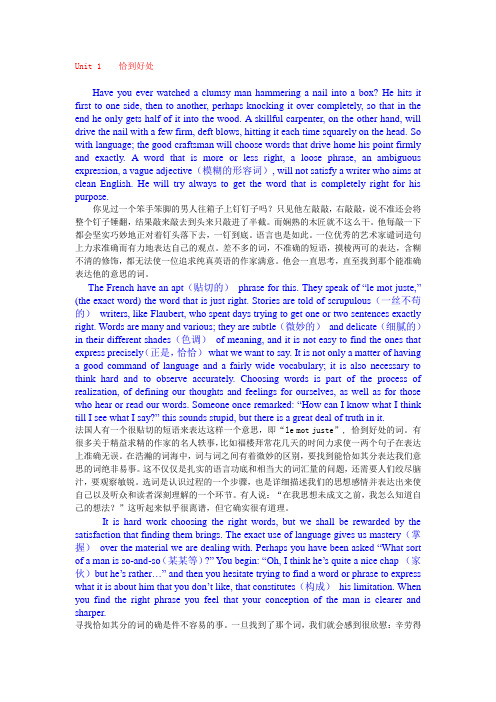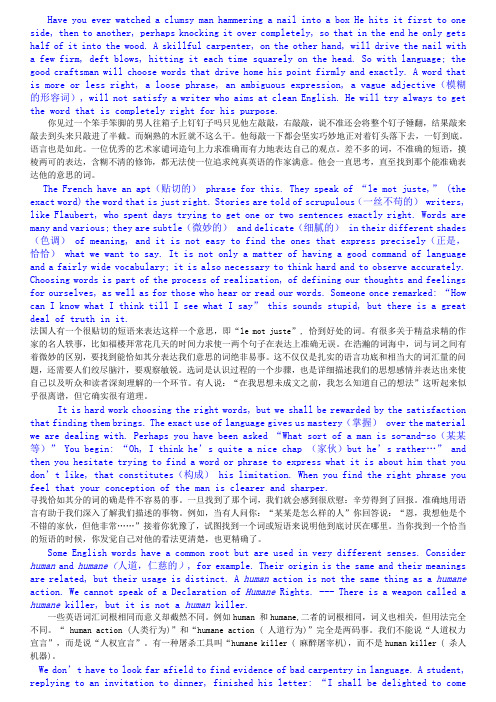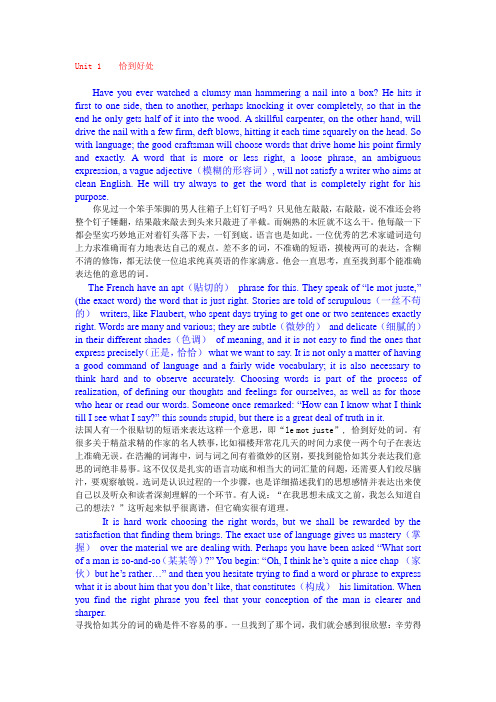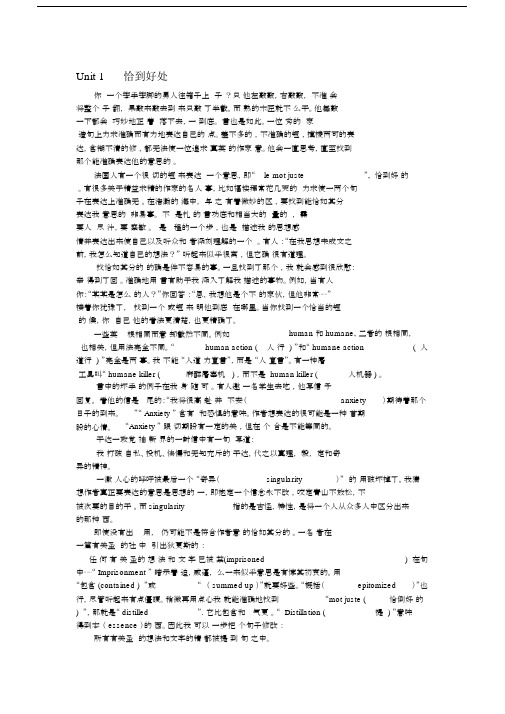新编英语教程5课文翻译(unit9)
全新版大学英语综合教程5 unit1 课后答案

1.(1) allot
(2) go through fire and water
(3) reside
(4) sobbed
(5) made no mention of
(6) sacrifice
(7) came upon
(8) rhythm
2. She had thought that books were natural wonders, coming up of themselves like grass. So it was "startling and disappointing" for her to find out that story books had been, contrary to her expectations, written by people.
(8) Answer: an old Ford
P24 cloze
(1) Answer: go through fire and water
(2) Answer: salary
(3) Answer: give
(4) Answer: no peace
(5) Answer: sink into
(7) inward
5. (1) Answer: have come upon / across
(2) Answer: had come out
(3) Answer: come on / up
(4) Answer: came across
(5) Answer: comes down to
7. The book was completely worn out - it was lacking its front cover, the back held on by strips of pasted paper, and the pages stained; its illustrations had come unattached. Welty's father had lost his mother when he was seven, and this book was the only book he as a little boy had had of his own. Although he had never made any mention to his own children of the book, he had brought it along with him from Ohio to their house and shelved it in their bookcase.
新编英语教程5课文翻译unit115

Unit 1 恰到好处Have you ever watched a clumsy man hammering a nail into a box? He hits it first to one side, then to another, perhaps knocking it over completely, so that in the end he only gets half of it into the wood. A skillful carpenter, on the other hand, will drive the nail with a few firm, deft blows, hitting it each time squarely on the head. So with language; the good craftsman will choose words that drive home his point firmly and exactly. A word that is more or less right, a loose phrase, an ambiguous expression, a vague adjective(模糊的形容词), will not satisfy a writer who aims at clean English. He will try always to get the word that is completely right for his purpose.你见过一个笨手笨脚的男人往箱子上钉钉子吗?只见他左敲敲,右敲敲,说不准还会将整个钉子锤翻,结果敲来敲去到头来只敲进了半截。
而娴熟的木匠就不这么干。
他每敲一下都会坚实巧妙地正对着钉头落下去,一钉到底。
语言也是如此。
一位优秀的艺术家谴词造句上力求准确而有力地表达自己的观点。
新编英语教程5Unit1-8课文及译文参考

Have you ever watched a clumsy man hammering a nail into a box He hits it first to one side, then to another, perhaps knocking it over completely, so that in the end he only gets half of it into the wood. A skillful carpenter, on the other hand, will drive the nail with a few firm, deft blows, hitting it each time squarely on the head. So with language; the good craftsman will choose words that drive home his point firmly and exactly. A word that is more or less right, a loose phrase, an ambiguous expression, a vague adjective(模糊的形容词), will not satisfy a writer who aims at clean English. He will try always to get the word that is completely right for his purpose.你见过一个笨手笨脚的男人往箱子上钉钉子吗只见他左敲敲,右敲敲,说不准还会将整个钉子锤翻,结果敲来敲去到头来只敲进了半截。
而娴熟的木匠就不这么干。
他每敲一下都会坚实巧妙地正对着钉头落下去,一钉到底。
语言也是如此。
一位优秀的艺术家谴词造句上力求准确而有力地表达自己的观点。
差不多的词,不准确的短语,摸棱两可的表达,含糊不清的修饰,都无法使一位追求纯真英语的作家满意。
李观仪《新编英语教程(5)》(第3版)学习指南【词汇短语+课文精解+全文翻译+练习答案】

李观仪《新编英语教程(5)》(第3版)学习指南【词汇短语+课文精解+全文翻译+练习答案】目录Unit 1 一、词汇短语 二、参考译文 三、课文注释 四、练习答案Unit 2 一、词汇短语 二、参考译文 三、课文注释 四、练习答案Unit 3 一、词汇短语 二、参考译文 三、课文注释 四、练习答案Unit 4 一、词汇短语 二、参考译文 三、课文注释 四、练习答案Unit 5 一、词汇短语 二、参考译文 三、课文注释 四、练习答案Unit 6 一、词汇短语 二、参考译文 三、课文注释 四、练习答案Unit 7 一、词汇短语 二、参考译文 三、课文注释 四、练习答案Unit 8 一、词汇短语 二、参考译文 三、课文注释 四、练习答案Unit 9 一、词汇短语 二、参考译文 三、课文注释 四、练习答案Unit 10 一、词汇短语 二、参考译文 三、课文注释 四、练习答案Unit 11 一、词汇短语 二、参考译文 三、课文注释 四、练习答案Unit 12 一、词汇短语 二、参考译文 三、课文注释 四、练习答案弘博学习网————各类考试资料全收录内容简介《新编英语教程(第3版)学习指南》按照原教材的课次进行编写,每单元涉及单元语法、词汇短语、参考译文、课文精解以及练习答案等内容,旨在帮助学生更好、更高效地学习和掌握教材中的重点及难点知识,具有很强的针对性和实用性。
在编写过程中,该书力求突出重点,答疑难点,语言言简意赅,讲解深入浅出,希望它能得到广大英语专业学生和英语自学者的喜爱和认可。
弘博学习网————各类考试资料全收录Unit 1一、词汇短语Text I1clumsy [5klQmzi] adj. moving or doing things in a very awkward way 笨拙的,拙劣的:I spilt your coffee. Sorry—that was clumsy of me.我把你的咖啡弄洒了。
新编英语教程5课文翻译(unit1~15)

Unit 1 恰到好处Have you ever watched a clumsy man hammering a nail into a box? He hits it first to one side, then to another, perhaps knocking it over completely, so that in the end he only gets half of it into the wood. A skillful carpenter, on the other hand, will drive the nail with a few firm, deft blows, hitting it each time squarely on the head. So with language; the good craftsman will choose words that drive home his point firmly and exactly. A word that is more or less right, a loose phrase, an ambiguous expression, a vague adjective(模糊的形容词), will not satisfy a writer who aims at clean English. He will try always to get the word that is completely right for his purpose.你见过一个笨手笨脚的男人往箱子上钉钉子吗?只见他左敲敲,右敲敲,说不准还会将整个钉子锤翻,结果敲来敲去到头来只敲进了半截。
而娴熟的木匠就不这么干。
他每敲一下都会坚实巧妙地正对着钉头落下去,一钉到底。
语言也是如此。
一位优秀的艺术家谴词造句上力求准确而有力地表达自己的观点。
(完整word版)新编英语教程5(1-12)课文翻译.docx

Unit 1恰到好处你一个笨手笨脚的男人往箱子上子?只他左敲敲,右敲敲,不准会将整个子翻,果敲来敲去到来只敲了半截。
而熟的木匠就不么干。
他每敲一下都会巧妙地正着落下去,一到底。
言也是如此。
一位秀的家造句上力求准确而有力地表达自己的点。
差不多的,不准确的短,摸棱两可的表达,含糊不清的修,都无法使一位追求真英的作家意。
他会一直思考,直至找到那个能准确表达他的意思的。
法国人有一个很切的短来表达一个意思,即“ le mot juste”, 恰到好的。
有很多关于精益求精的作家的名人事,比如福楼拜常花几天的力求使一两个句子在表达上准确无。
在浩瀚的海中,与之有着微妙的区,要找到能恰如其分表达我意思的非易事。
不是扎的言功底和相当大的量的,需要人尽汁,要察敏。
是程的一个步,也是描述我的思想感情并表达出来使自己以及听众和者深刻理解的一个。
有人:“在我思想未成文之前,我怎么知道自己的想法?” 听起来似乎很离,但它确很有道理。
找恰如其分的的确是件不容易的事。
一旦找到了那个,我就会感到很欣慰:辛得到了回。
准确地用言有助于我深入了解我描述的事物。
例如,当有人你:“某某是怎么的人?”你回答:“恩,我想他是个不的家伙,但他非常⋯⋯”接着你犹豫了,找到一个或短来明他到底在哪里。
当你找到一个恰当的短的候,你自己他的看法更清楚,也更精确了。
一些英根相同而意却截然不同。
例如human 和 humane, 二者的根相同,也相关,但用法完全不同。
“human action (人行 ) ”和“ humane action( 人道行 ) ”完全是两事。
我不能“人道力宣言”,而是“人宣言”。
有一种屠工具叫“ humane killer (麻醉屠宰机 ) ,而不是 human killer (人机器 ) 。
言中的坏手的例子在我身随可。
有人邀一名学生去吃,他写信予回复。
看他的信是尾的:“我将很高赴并不安(anxiety)期待着那个日子的到来。
”“ Anxiety ”含有和恐惧的意味。
李观仪《新编英语教程》学习指南【词汇短语+课文精解+全文翻译+练习答案】(Unit9)
李观仪《新编英语教程》学习指南【词汇短语+课⽂精解+全⽂翻译+练习答案】(Unit9)Unit 9⼀、词汇短语Text I1. elicit v. to give rise to; evoke引出,引起e.g. Mr. Norris said he washopeful that his request would elicit a positive response.诺⾥斯先⽣说他希望他的要求会引起积极的回应。
2. anarchy n.disorder; confusion⽆秩序,混乱e.g. The concept ofself-organizing teams does not imply anarchy. ⾃组织团队的概念不意味着⽆政府状态。
3. blithely adj. in a happy and carefree manner快活地,⽆忧⽆虑地;漫不经⼼地e.g. They blithely carried on chatting, ignoring the customerswho were waiting to be served. 他们继续开⼼地聊天,将等着购物的顾客们置于⼀边。
4. n.being deserted and allowed to fall intoruins遗弃,弃置e.g. The previous owners had rescued the building fromdereliction. 以前的主⼈把这座建筑物从废墟中挽救了出来。
5. graff n.drawings or writing on a public wall, usuallyhumorous, obscene or political(在公共墙壁上涂写的)图画或⽂字,涂鸦e.g.Buildings old and new are thickly covered with graffiti.新旧建筑物都覆盖着密密⿇⿇的涂鸦。
新编英语教程5(词汇Unit1-10)
Unit One Hit the Nail on the Head1. drive sth home: force (the nail) into the right place; make sth unmistakably clear.2. scrupulous: painstaking, meticulous3. far afield: very far away4. rife:1) widespread, common 2)full of5. leader: British English for newspaper editorial6. coercion: pressure, compulsion7. epitomize: be typical of; serve as the typical example of8. disprove: prove to be contrary; refute9. expire: die, pass away; come to an end10. indigent: poverty-stricken, pennilessUnit Two Beware the dirty seas1. sluice: (v.) to pour as if from a sluice(水闸),i.e., a man-made passage for water fitted with a gate for stopping and regulating the flow; (n.) a channel controlling water flow2. nurture: further the development of; care for3. evolve: develop gradually (by a long continuous process)4. endemic: (of a disease) found regularly in a particular place5. litany: repetition. The literal meaning of “litany” is “a prayer consisting of a series of invocations and supplications by the leader with responses by the congregation”.6. flush: pour; flood with water to clean out (See dictionary)7. lurk: exist unseen8. effluent: liquid wastes, such as chemicals or sewage that flows out from a factory or some other places into a river or the sea9. plankton: very small forms of plant and animal life that live in a body off water 浮游生物10. slime: unpleasant sticky substance, such as the thick sticky liquid on the skin of various fishUnit Three My Friend, Albert Einstein1. knack: a clever way of doing things2. be in awe of: have respect as well as fear and reverence for3. staggering: unexpectedly surprising; astounding4. vestiges: traces5. ultimately: finally; after a long series of time6. recalcitrant: hard to deal with; unmanageable7. worry: assail a problem again and again until it is solved, just like a dog biting some small animals repeatedly, shaking it or pulling it with the teeth8. surcease: (archaic) cessation, pause9. plausible: seeming to be reasonable10. a house of cards: an insecure scheme11. ineffable: unutterable; incapable of being expressed in words12. elusively whimsical: indescribably quaint or strange 捉摸不透的,古怪Unit Four The Invisible Poor1. perennial: lasting forever or for a long time2. rutted roads: roads with deep, narrow marks made by the wheels of vehicles3. be exempt from: be freed from a duty. service, payment, etc.4. tenement: a large building, especially one in the poor part of a city, which is divided into small flats which are rented cheaply5. affluent: wealthy, prosperous6. compound v.: /kom'paund/ make worse by adding (something) to . . . (often used in the passive)7. existential: relating to human experience (a formal-word)8. lurid: sensational, shocking9. dispossessed: people who have lost all their possessions10. cynical: doubtful as to whether something will happen or whether it is worthwhile11. involvement: connection12. old rhetoric of reform: writings about reform in the past that sounded fine and important, but were really insincere and meaninglessUnit Five The Plug—in Drug:TV and the American Family,PartⅠ1. afflict: trouble2. asset: valuable object; advantage3. preposterous: unthinkable, absurd4. splintering: splitting, breaking up5. the peer group: a group of people of the same age, class, position. etc. here, group of children of the same age6. television-oriented: interested in and influenced by TV7. equivocal: ambiguous8. sorcerer: person who performs magic by using the power of evil spirits9. stint: fixed amount of work: here, the fixed TV programme10. conjure up: bring into the mind11. sane: (in this context) in possession of good relations/of a close bond12. backlog: a reserveUnit Six Preparing for College1. driving motive: the incentive / encouragement that urges them on;2. the rudiments: the basics, the fundamentals (The word rudiments is always in the plural form when used in this sense.)3. metaphysics: the branch of philosophy that deals with abstract concepts, etc. 形而上学,玄学,纯粹哲学4. conscious culture: the culture (i.e. customs, arts, etc,) that is directly perceptible or known to us5. fanatic: one who is very enthusiastic about a particular activity6. personify: express or represent ( a quality in human form)7. sedentary: inactive; done while sitting down8. underline: indicate the importance of9. balked: baffled; frustrated10. a maddening lot: a wild, uncontrollable group11. righteous sects: morally justifiable groups of people whose religious beliefs are considered different form those of a larger group12. relish: 味,味道,兴趣;开胃小菜;great enjoymentUnit Seven Grouping the Gifted:Pro1. innate: belonging to an individual from birth2. pursuit: an activity that one engages in as a profession, vocation, or avocation3. athlete: person who practises athletics; competitor or skilled performer in physical exercises4. heterogeneously: in such a way that members are very different from one another5. criterion /--ia: standard on which a decision may be based6. snob: one who has an offensive air of superiority (here, in matters of knowledge)7. elite: a socially superior group8. instill: put (ideas, etc. ) gradually but firmly into someone's mind by continuous effort9. spark: encourage; stimulate into greater activity10. latent: present and capable of becoming though not now visible or active11. skyrocket: rise or increase rapidly12. pay dividends: produce an advantage. especially as a result of an earlier action (dividend: that part of the money made by a business which is divided among those who own shares in the business 红利)Unit Eight Why Nothing Works1. savant: a man of learning, especially a person with detailed knowledge in some specialized field2. corollary: an immediate inference from a proved proposition3. forestall: defeat, prevent by prior measures4. commitment: a pledge to follow certain beliefs or a certain course of action; devotion (to duty etc. )5. artifact: a usually small object (as a tool or an ornament) showing human workmanship that has special historical interest6. evoke: bring to mind7. projectile point: the tip of a weapon that is thrust forward; spear or arrowhead8. band: a group of people formed for some common purpose and often with a leader9. barter: trade by exchanging one commodity for another10. alienation: a withdrawing or separation of a person from an object or position of former attachment; a feeling of not belonging to or being part of one's surroundingsUnit Nine Where Is the News Leading Us?1. symposium: a conference in which experts or scholars discuss a certain subject2. scrutinize: examine very closely and carefully3. distortion: misrepresentation; a false or dishonest account4. eruptive: (in this context) sensational, shocking, disturbing5. collide with: crash violently into; run into (one another)6. ingredient: a component part of something7. inhibitor: one who holds back, prevents8. deplete: exhaust, use up, reduce9. cynicism: disbelief in the sincerity of human motives10. antidote: remedy, corrective; something that prevents or counteracts11. envision: picture mentally, imagine, visualize12. caricature: a picture ludicrously滑稽的exaggerating the peculiarities or defects of persons or thingsUnit Ten Things:The Throw—Away Society1. Humanoid: having human form or characteristics2. texture: the degree of roughness or smoothness, coarseness or fineness, of a substance or material, especially as felt by touch; visual and tactile qualities of a surface3. staggering: stunning, wondrous, breathtaking4. deride: laugh at contemptuously; to scoff at or mock5. transience: temporariness, impermanence; the quality or state of being temporary or impermanent6. at a rapid clip: (informal) at a fast pace7. inextricably embedded: so deeply involved that it is impossible to get free8. boutique: a small fashionable clothes shop9. sumptuous: expensive and grand10. train: a part of a long dress that spreads over the ground behind the wearer11. A-line dresses: dresses with a flared bottom and close-fitting top, having an "A" or tent-like shape12. supplant: take the place of; replace。
新编英语教程unit1,2,3,4,5,8,9,10,11 课文翻译
翻译Unit111、他暗示John是肇事者的企图是徒劳的。
(insinuate,futile)暗示,无用的;无效的His attempt at insinuating that John was the culprit turned out to be futile.2、当他未能完成期望他做的事时,他很善于临时找个借口来为自己开脱。
(improvise)临时做He is very clever at improvising excuses when he fails to do what is expected of him.3、他此行去西藏可以满足他想参观布达拉宫的愿望了。
(gratify)使满足;使满意,使高兴His trip to Tibet will gratify his desire to see Potala. (the Potala Palace)4、这个公司拥有雄厚的人力资源。
(command)命令,指挥;控制This corporation commands excellent/rich/abundant human resources.5、另外想个办法去款待你的客人。
不要老是请他们看影视光碟。
(alternative)二中择一;供替代的选择Think of an alternative way of entertaining your guests. Don’t always show them VCDs.6、沉溺于胡思乱想和心血来潮是有害的。
(caprice)任性,反复无常;随想曲It is harmful to indulge in whims and caprices.7、不属于你的东西不要作非分之想。
(lay one’s hands on,be entitled to)2有权;有…的资格Try not to lay your hands on anything that you are not entitled to.8、他没有来参加竞赛。
新编英语教程5 Unit 9 Where Is the News Leading Us教学文案
新编英语教程5U n i t 9W h e r e I s t h eN e w s L e a d i n g U sUnit NINE: TEXT IWords and Expressions1)symposium (l. 1)n. a conference in which experts or scholars discuss a certain subject座谈会;学术报告会;专题讨论会2)to the core (l. 3)through and through; completely 货真价实;反复;彻头彻尾e.g. rotten to the core 透心腐烂;糟糕透顶unrelieved (l. 35): utter; complete 完全的;彻头彻尾的;完完全全的:unrelieved boredom 完全的厌倦3)ways and means (l. 2) n. (a set phrase) 方式;方法;手段e.g. There are several ways and means of approaching this problem.对于这个问题有好几种处理办法。
4)scrutinize (l. 5)vt. examine very closely and carefullyn. scrutiny (l. 44)e.g. His proposal to improve public transportation is under close scrutiny.5)disaster-prone (l. 9)tending to report disasters; interested in reporting disastersprone: adj. likely to suffer from an illness; tending to show a particular negative characteristic.e.g. be prone to err 易犯过失 be prone to think that 总认为She is prone to anger / exaggeration / flu.Syn: be likely to do; be inclined to do; be apt to do; be liable to doProne may also be used after a noun with a hyphen combining the two,e. g., accident-prone (often having accidents), injury-prone (oftengetting injuries)6)distortion (l. 15)n. a false or dishonest account; a statement that twists fact; amisrepresentation歪曲;曲解7)apt (l. 22)be apt to do: be likely to do辨析:apt, liable; pronea) apt 是常用词, 尤其是用在口语中, 表示“有...倾向的”、“易于...的”, 如:He is apt to get excited over trifles. 他容易为小事而激动。
- 1、下载文档前请自行甄别文档内容的完整性,平台不提供额外的编辑、内容补充、找答案等附加服务。
- 2、"仅部分预览"的文档,不可在线预览部分如存在完整性等问题,可反馈申请退款(可完整预览的文档不适用该条件!)。
- 3、如文档侵犯您的权益,请联系客服反馈,我们会尽快为您处理(人工客服工作时间:9:00-18:30)。
Unit Nine: 新闻将我们引向何方
不久前我应邀参加了一次有关美国报业的作用的公众研讨会。
还有另外两个嘉宾也出席了。
一位是知名的电视节目主持人,另一位是美国一家主要报纸的编辑,他是一位彻头彻尾的新闻工作者---- 在据实报道的方式上坚忍不拔、积极进取且见识过人。
据我所知本次研讨旨在审查传媒的义务,并提出实现那些义务的最佳途径。
在公开讨论时,观众席中的一位男士向两位嘉宾提问,“为什么报纸和电视新闻节目都充斥灾难?为什么新闻界的男男女女对悲剧、暴力、和失败是如此关注?”
主持人和编辑作出了回答,好像是自己应该为坏消息的存在而受到谴责一样。
他们说,新闻工作者只负责报道新闻,而不负责制造或修改新闻。
我不认为这两位新闻工作者回答了这个问题。
提出这个问题的先生并没有因为世上的歪曲报道而谴责他们。
他只是想知道为什么报道得最多的是歪曲的事件。
新闻媒体的运作理念似乎是凡是新闻皆坏事。
为什么呢?是不是着重报道负面新闻是一种传统——是新闻工作者所习以为常的对日常事件作出的反应方式?
在此或许分析一下我们如何定义“新闻”一词会有所帮助,因为这是问题的起因。
新闻应该是报道过去十二小时,最迟二十四小时内所发生的事情。
然而,突发事件往往具有爆炸性的:一名狙击手枪杀了几名行人,一名恐怖分子劫持了飞机上250名人质,欧佩克石油组织宣布原油价格上涨25%,英国货币又贬值10%,一辆载有放射性废料的卡车与一架水泥搅拌车相撞。
然而,一味聚焦这些报道,则是失真的画面。
人类文明成果远远多于灾难总和。
每种文明中最重要的成分就是进步。
但进步不会立即发生,也没有爆发性。
一般来说,它是一点一滴逐步发展的,在某个特定时刻是微不足察的。
但是所有微小的进步都参与了历史性的巨变的实现,使社会更加美好。
就是这类活生生的历史,绝大多数的新闻媒体没有予以充分的反映,结果导致我们对社会的正面发展了解不足,对灾难却知之甚多,这又使人产生失败和绝望的情绪,而这些情绪易于阻碍社会进步。
爆发性新闻大餐另人忧心忡忡,大大削减了自由社会所需的动力,绝望和偾世的情绪使人没有动力迎接严峻的考验。
我并非暗示可以编造“积极”的新闻来抵消头版上灾难报道的作用。
也没有把青年基督会作用的深刻报道定义为“正面”新闻。
我要传递的观点是,新闻媒体的职责是搜寻并报道重大事件,无论它们是否有关冲突、对抗或灾难。
这个世界是天堂和地狱的绝妙结合,两个方面都需要关注和观察。
我希望新闻界人士能从更宽广的角度审视自己的职责。
是时候认识到人类事件中可以作为新闻报道的范围领域是极其宽广的。
例如,有几篇新闻文章报道过固氮作用——植物通过这一过程能固定氮肥,由此减低了肥料需求量?全世界的科学家都在为这一前景而努力,希望借此解决饥荒。
对远东地区水稻产量提高的巨大进步又了解多少?事实上,世界上还有许多类似的重要发展,这些都值得做重要的新闻综合报道。
主持人和编辑说得对,新闻工作者并没有责任来塑造世界,但是他们有责任影响我们的态度。
我们认为自己是怎样的,那我们就是怎样的。
我们只能实现那些我们自己敢于设想的目标。
新闻工作者为我们提供我们对自身以及这个世界认知的写照——这种写照最好是逼真的肖像,而不是扭曲的漫画像。
因为我们就是根据这一写照来做决定,筹划未来的。
按照华特.里普曼的说法,新闻记者是大众的哲学家。
他曾经写道?“后天习得的文化并非由基因遗传,美好社会的甜美的生活虽然可得,但却不是一旦拥有就永远不失去。
如果美好生活中的智慧没有被传下来,所得一切也将化为乌有。
”
有了对美好社会中美好生活的准确报道,我们可以采用伯纳德.德.查维斯建议我们的利
用历史的方式,并以此来利用新闻——在我们的经验之上提高自己。
因此,使他们能“像坐在巨人肩上的矮子,比前人看得更高更远。
”
一连串取代该物品的其他物品发生联系。
